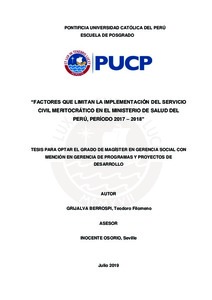| dc.contributor.advisor | Inocente Osorio, Seville | |
| dc.contributor.author | Grijalva Berrospi, Teodoro Filomeno | |
| dc.date.accessioned | 2020-02-06T17:20:22Z | |
| dc.date.available | 2020-02-06T17:20:22Z | |
| dc.date.created | 2019 | |
| dc.date.issued | 2020-02-06 | |
| dc.identifier.uri | http://hdl.handle.net/20.500.12404/15866 | |
| dc.description.abstract | La política del Servicio Civil es liderada por la Autoridad Nacional del Servicio Civil –
SERVIR, como ente rector, y el Ministerio de Salud como organismo ejecutor. La
presente investigación se ha centrado en analizar los factores que limitan la
Implementación del Servicio Civil meritocrático materializado mediante Ley N°30057, Ley
del Servicio Civil en la sede central del Ministerio de Salud, autoridad sanitaria nacional.
Después de cuatro años de iniciado el proyecto, no hay (o no se observan) avances
significativos, lo que motivaron la presente investigación, cuya pregunta central es la
siguiente: ¿Cuáles son los factores que limitan la implementación del Servicio Civil
meritocrático en el Ministerio de Salud del Perú, período 2017 - 2018?
Las variables analizadas fueron el marco normativo, el liderazgo de las autoridades, el
conocimiento, información y opinión de sus servidores; el objetivo general y los
específicos se centraron en identificar los factores desde una mirada contextual del
problema del servicio civil.
Esta investigación es un estudio de caso de carácter descriptivo, la estrategia
metodológica empleada es mixta (cualitativa y cuantitativa), y las técnicas empleadas
fueron la entrevista, encuesta y revisión documentaria.
La investigación ha encontrado algunos hallazgos: los servidores del MINSA se regulan
por una multiplicidad de normas, hay una débil conducción en la implementación de la ley
de parte de las autoridades, existen brechas en el conocimiento de los servidores, y
debilidad en la información. Como alternativa a esa situación, se plantea un plan de
mejora: el fortalecimiento de capacidades, la formulación de un marco normativo de
carrera especial para el personal de la salud y un mejor sistema de información que
responda a las necesidades de los usuarios. De aplicarse estas mejoras (totalmente
viables), la contribución de la investigación y la Gerencia Social serán sustantivos en el
proceso de Implementación del Servicio Civil meritocrático en la sede central del
Ministerio de Salud. | es_ES |
| dc.description.abstract | The Civil Service policy is led by the National Civil Service Authority - SERVIR, as the
governing body, and the Ministry of Health as the executing agency. This research has
focused on analyzing the factors that limit the implementation of the Meritocratic Civil
Service materialized by Law No. 30057, Civil Service Law at the headquarters of the
Ministry of Health, national health authority. After four years of initiating the project, there
are no (or no observed) significant advances, which motivated the present investigation,
whose central question is the following: What are the factors that limit the implementation
of the Meritocratic Civil Service in the Ministry of Health of Peru, period 2017 - 2018?
The variables analyzed were the regulatory framework, the leadership of the authorities,
the knowledge, information and opinion of their servers; The general objective and the
specific ones focused on identifying the factors from a contextual view of the civil service
problem.
This investigation is a descriptive case study, the methodological strategy used is mixed
(qualitative and quantitative), and the techniques used were the interview, survey and
documentary review.
The investigation has found some findings: MINSA's servers are regulated by a multiplicity
of rules, there is a weak conduction in the implementation of the law by the authorities,
there are gaps in the knowledge of the servers, and weakness in the information. As an
alternative to this situation, an improvement plan is proposed: capacity building, the
formulation of a special career regulatory framework for health personnel and a better
information system that responds to the needs of users. If these improvements (fully
viable) are applied, the research contribution and the Social Management will be
substantive in the Meritocratic Civil Service Implementation process at the headquarters
of the Ministry of Health. | es_ES |
| dc.description.uri | Tesis | es_ES |
| dc.language.iso | spa | es_ES |
| dc.publisher | Pontificia Universidad Católica del Perú | es_ES |
| dc.rights | info:eu-repo/semantics/openAccess | es_ES |
| dc.rights.uri | http://creativecommons.org/licenses/by-nc-sa/2.5/pe/ | * |
| dc.subject | Perú. Autoridad Nacional del Servicio Civil | es_ES |
| dc.subject | Perú. Ministerio de Salud | es_ES |
| dc.subject | Recursos humanos--Legislación--Perú | es_ES |
| dc.subject | Gestión pública--Perú | es_ES |
| dc.subject | Servicio civil--Legislación--Perú | es_ES |
| dc.title | Factores que limitan la implementación del servicio civil meritocrático en el Ministerio de Salud del Perú, período 2017 – 2018 | es_ES |
| dc.type | info:eu-repo/semantics/masterThesis | es_ES |
| thesis.degree.name | Maestro en Gerencia Social con mención en Gerencia de Programas y Proyectos de Desarrollo | es_ES |
| thesis.degree.level | Maestría | es_ES |
| thesis.degree.grantor | Pontificia Universidad Católica del Perú. Escuela de Posgrado | es_ES |
| thesis.degree.discipline | Gerencia Social con mención en Gerencia de Programas y Proyectos de Desarrollo | es_ES |
| renati.discipline | 314397 | es_ES |
| renati.level | https://purl.org/pe-repo/renati/level#maestro | es_ES |
| renati.type | http://purl.org/pe-repo/renati/type#tesis | es_ES |
| dc.publisher.country | PE | es_ES |
| dc.subject.ocde | https://purl.org/pe-repo/ocde/ford#5.09.00 | es_ES |






